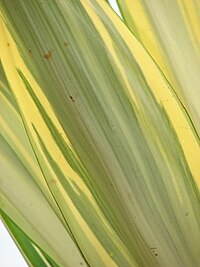
Fique is a natural fibre that grows in the leaves of plants in the genus Furcraea. Common names include fique, cabuya, pita, penca, penco, maguey, cabui, chuchao and coquiza.[1]
The Indigenous peoples of the Americas extracted and used the fique fibers to make garments, ropes, and hammocks—among many things—for several centuries before the arrival of Spanish conquerors.[citation needed]
In the 17th century, Dutch colonists carried the plant from their Brazilian colonies in Pernambuco to the island of Mauritius. The native inhabitants of the island learned to use the fibre and called it caraguatá-acú, croatá-acu or gravatá-acú.
The fibre was also introduced to St. Helena, India, Sri Lanka, Algeria, Madagascar, East Africa, Mexico and Costa Rica.
In the 18th century, in Dagua, Valle del Cauca, Colombia, the priest Feliciano Villalobos started the first rope and wrapping materials manufacturing industry; his products were made of fique. In 1880 the Colombian government reported a yearly production of three million kilograms of fibres, the exportation to Venezuela of two million, the fabrication of five millions pairs of alpargatas and four million metres of rope.[citation needed]
Between 1970 and 1975 the fique industry suffered a crisis brought about by the development of polypropylene, which costs less and is produced faster.
Today, fique is considered the Colombian national fibre and is used in the fabrication of ethnic products, Colombian handicrafts and recently (since July 2007) has been used for the heat protectors (handmade in Barichara) placed around the Colombian coffee cups sold in the Juan Valdez coffee shops worldwide.[2]
The fique can be obtained from several species of Furcraea, such as F. macrophylla Baker, cabuya Trel, andina Trel, and castilla. Depending on the processing of the fiber and the species used, many varieties of fique fibers can be obtained.[3] Among others:
Optimal conditions for the growing of the fique plant are:
Fique crops bring nitrogen to the soil, improving its fertility. The plant is very adaptable to different ecological conditions. A fique plant can produce 1 to 6 kg of fiber each year.